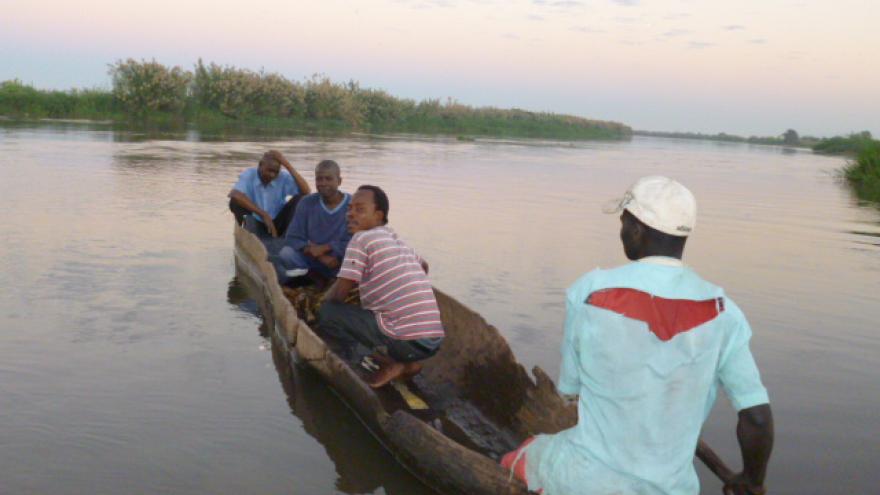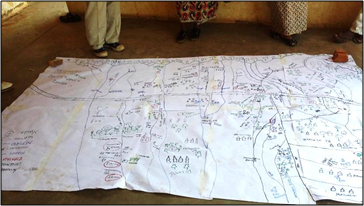
“I never expected that in my lifetime the problem of water in my area would ever be solved. I am so thankful that our newly elected councilor came together with other leaders to make this happen.”
Televina Zuwawo, who lives in Nsanje district in southern Malawi
Defining the Campaign Issue
In some parts of Malawi, naturally occurring water sources often evaporate in the dry season. And even when water is available, it is not always safe to drink, which forces residents to choose between dehydration or a heightened risk of disease. Citizens living in the southern district of Nsanje are particularly affected by drinking water shortages, but they face other challenges as well: schools are in disrepair and unwelcoming to girls, and the agriculture sector is no longer lucrative.
Like many problems affecting the poor, these have complex roots and elusive solutions, starting with a disconnect between citizens and public officials. Citizens in Malawi have not played an active role in local development policy making. Instead, development plans have been tightly controlled by local executive offices. These officials may consult with councils of un-elected community leaders called Village Development Committees and Area Development Committees, but citizens are rarely consulted. The same is true when it comes to the use of constituency development funds allocated to each member of parliament. These leaders are typically based in the capital city, Lilongwe, so it is challenging for citizens to advocate for collective community needs. Elections for local lawmakers, called ward councilors, held in May 2014 provided citizens a new opportunity to establish a closer relationship with local government. For the first time in 15 years, these elections would reestablish a cadre of leaders mandated to address local development issues.
Strategic Approach
Tiphedzane is a non-governmental organization that has worked on quality of life issues in the Nsanje district since 2003. It had some success addressing community needs through education programs and the provision of basic social services, but recognized that some improvements would never come without support from government officials. To influence the direction of development spending in Nsanje district to align with citizens’ priorities, Tiphedzane chose to use local elections to begin building relationships with the new ward councilors, by organizing community members around their priorities and engaging prospective council members in discussions about the issues. Tiphedzane understood that the new local councilors, who often live in their communities after they are elected, could be strong allies. So the 2014 polls provided a practical opening for Tiphedzane to take actions to build political support for the quality of life changes, including clean water.
Tactical Actions
Tiphedzane employed a coordinated set of activities during local election period. It mobilized citizens around a clear set of priorities and encouraged turnout on election day. Tiphedzane also organized a series of debates where local candidates could discuss their plans to address the community priorities and citizens could compare the different positions.
Voter education - Tiphedzane found there was a need to educate citizens on the role and responsibility of the new ward councilors, since that level of government had not existed for 15 years. For example, citizens needed to know that the new councils would be required to address local development issues. In addition, members of the Nsanje community had to be educated on their own roles and responsibilities as citizens of a democracy. This encouraged them to resist attempts to buy their votes, to eschew election violence and to make voting decisions based on candidates’ commitments on priority issues.Tiphedzane opted not to emphasize basic voter information, such as how, where and when to cast ballots, since Malawians had participated in numerous elections and were generally well-informed about the process. Furthermore, the Malawi Electoral Commission (MEC) and a well-funded organization called the National Institute for Civic Education (NICE) provided that kind of information.
Issue identification - Once citizens had a better understanding of their role in setting development priorities for the community, Tiphedzane brought them together to articulate key needs. This involved an exercises where community members would create a map of their community that illustrated challenges and identified resources and potential solutions. New boreholes topped the list, but other issues included the need for affordable agricultural inputs, such as seeds or farming equipment, and new textbooks in schools.
Community Mapping Exercise
Back to Chapter:
Debates and social contracts- Then Tiphedzane worked with citizens to create “social contracts” to assist with their engagement efforts. The social contracts described the citizens’ development priorities based on the results of the previous mapping exercises.The Tiphedzane pre-election program culminated in a series of debates where citizens heard directly from the candidates about their platforms. Community members and the media engaged with the candidates by texting questions to the moderator. During the debates the citizens presented their social contracts and asked each of the candidates to sign a pledge that they would work on the community priority issues if elected.
Campaign Outcomes
As a result, newly elected local officials acted quickly to follow through on the commitments they made to find new sources of clean drinking water. George Dumba was one of the candidates who participated in the debate and signed the social contract with community members from Dinde, a ward in Nsanje district. After winning, Dumba worked with community leaders and their member of parliament to ensure that three boreholes were constructed in the ward.
“As a candidate competing for the position of councilor, the [Tiphedzane] project provided me an opportunity not only to engage with citizens during the electoral campaign, but also to understand that access to water was a top priority for the community,” said Dumba. “This in turn influenced me to rank this as the first issue to prioritize once elected.”
The clean drinking water that has flowed from the new boreholes was a welcome improvement in the quality of life. “We are extremely grateful to both our newly elected MP and councilor for providing us with safe water,” said the Mpomba village group headman, also named Mpomba. “This will improve the lives of the people.”
While the new boreholes are an important outcome of Tiphedzane’s organizing efforts, this activity has also begun to transform how politics is practiced and leading to new roles for citizens in setting development priorities and monitoring the follow through of local government.
Citizens have begun to understand that they have both the right and responsibility to articulate their needs to elected officials. Now, citizens are well-placed to hold their new councilors accountable in a way that would not have been possible with voting alone. After the election, citizens said they felt more confident about following up with elected officials to ensure they continued working on other community priorities.
The social contracts played an important symbolic role in this. In a democracy citizens are inherently imbued with the right to hold elected officials responsible for campaign promises. However, in a political environment where power imbalances have stunted the development of citizens’ political influence, signed documents that make explicit the promises of elected leaders help citizens feel more confident as they take initiatives to ensure that these promises are implemented.
Citizens were not the only group that benefited from Tiphedzane’s election activism. Candidates, like George Dumba, reported that they were pleased that communities developed the social contracts because it allowed them to tailor their campaigns to address local concerns. They also described feeling on-notice to follow through with campaign commitments because Tiphedzane and other citizen groups were watching them closely. While on its face, this could be seen as a nuisance, the elected leaders in Nsanje recognized it as an incentivize for on-going efforts to respond to citizen priorities, which helped them retain viability with the electorate.
Tiphedzane’s work also helped it emerge as a stronger organization with new resources and skills. First, Tiphedzane developed new or stronger relationships with candidates during the debate planning that increased its credibility. The successful candidates know they can turn to Tiphedzane for information and to serve as an interlocutor with community members on key issues.
Second, Tiphedzane has become more legitimate in the eyes of community members as a group that can help them organize and build power to influence development priorities in Nsanje. The recently-dug boreholes are the first example. Moreover, Tiphedzane developed a deeper understanding of the community’s needs and priorities through the issue identification activities, development of social contracts and debates. This allows the organization to be a more authoritative influence on local level policy discussions and the development planning process.

